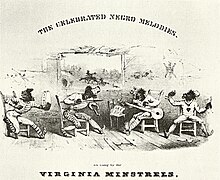User:Spencerb4king/Jazz practice page
Origins[edit]

By 1808 the Atlantic slave trade had brought almost half a million Africans to the United States. The slaves largely came from West Africa and brought strong tribal musical traditions with them.[1] Lavish festivals featuring African dances to drums were organized on Sundays at Place Congo, or Congo Square, in New Orleans until 1843, as were similar gatherings in New England and New York. African music was largely functional, for work or ritual, and included work songs and field hollers. The African tradition made use of a single-line melody and call-and-response pattern, but without the European concept of harmony. Rhythms reflected African speech patterns, and the African use of pentatonic scales led to blue notes in blues and jazz.[2]

In the early 19th century an increasing number of black musicians learned to play European instruments, particularly the violin, which they used to parody European dance music in their own cakewalk dances. In turn, European-American minstrel show performers in blackface popularized such music internationally, combining syncopation with European harmonic accompaniment. Louis Moreau Gottschalk adapted African-American cakewalk music, South American, Caribbean and other slave melodies as piano salon music. Another influence came from black slaves who had learned the harmonic style of hymns and incorporated it into their own music as spirituals.[3] The origins of the blues are undocumented, though they can be seen as the secular counterpart of the spirituals. Paul Oliver has drawn attention to similarities in instruments, music and social function to the griots of the West African savannah.[4]
Notes[edit]
- ^ Cooke 1999, pp. 7–9
- ^ Cooke 1999, pp. 11–14
- ^ Cooke 1999, pp. 14–17, 27–28
- ^ Cooke 1999, p. 18
References[edit]
- Cooke, Mervyn (1999). Jazz. London: Thames and Hudson. ISBN 0-500-20318-0..
- Oliver, Paul (1970). Savannah Syncopators: African Retentions in the Blues. London: Studio Vista. ISBN 0-289-79827-2..
